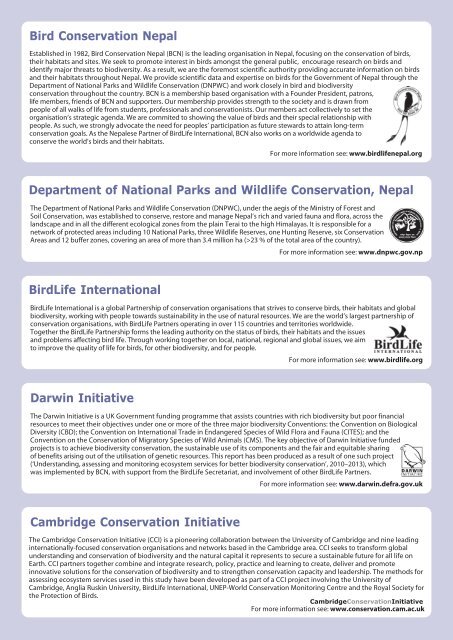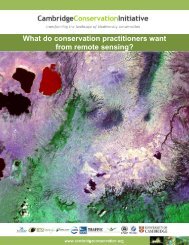CONSERVING BIODIVERSITY & DELIVERING ECOSYSTEM SERVICES
conserving biodiversity & delivering ecosystem services
conserving biodiversity & delivering ecosystem services
Create successful ePaper yourself
Turn your PDF publications into a flip-book with our unique Google optimized e-Paper software.
Established in 1982, Bird Conservation Nepal (BCN) is the leading organisation in Nepal, focusing on the conservation of birds,<br />
their habitats and sites. We seek to promote interest in birds amongst the general public, encourage research on birds and<br />
identify major threats to biodiversity. As a result, we are the foremost scientific authority providing accurate information on birds<br />
and their habitats throughout Nepal. We provide scientific data and expertise on birds for the Government of Nepal through the<br />
Department of National Parks and Wildlife Conservation (DNPWC) and work closely in bird and biodiversity<br />
conservation throughout the country. BCN is a membership based organisation with a Founder President, patrons,<br />
life members, friends of BCN and supporters. Our membership provides strength to the society and is drawn from<br />
people of all walks of life from students, professionals and conservationists. Our members act collectively to set the<br />
organisation’s strategic agenda. We are commited to showing the value of birds and their special relationship with<br />
people. As such, we strongly advocate the need for peoples’ participation as future stewards to attain long-term<br />
conservation goals. As the Nepalese Partner of BirdLife International, BCN also works on a worldwide agenda to<br />
conserve the world’s birds and their habitats.<br />
For more information see: www.birdlifenepal.org<br />
<br />
The Department of National Parks and Wildlife Conservation (DNPWC), under the aegis of the Ministry of Forest and<br />
Soil Conservation, was established to conserve, restore and manage Nepal’s rich and varied fauna and flora, across the<br />
landscape and in all the different ecological zones from the plain Terai to the high Himalayas. It is responsible for a<br />
network of protected areas including 10 National Parks, three Wildlife Reserves, one Hunting Reserve, six Conservation<br />
Areas and 12 buffer zones, covering an area of more than 3.4 million ha (>23 % of the total area of the country).<br />
For more information see: www.dnpwc.gov.np<br />
<br />
BirdLife International is a global Partnership of conservation organisations that strives to conserve birds, their habitats and global<br />
biodiversity, working with people towards sustainability in the use of natural resources. We are the world’s largest partnership of<br />
conservation organisations, with BirdLife Partners operating in over 115 countries and territories worldwide.<br />
Together the BirdLife Partnership forms the leading authority on the status of birds, their habitats and the issues<br />
and problems affecting bird life. Through working together on local, national, regional and global issues, we aim<br />
to improve the quality of life for birds, for other biodiversity, and for people.<br />
For more information see: www.birdlife.org<br />
<br />
The Darwin Initiative is a UK Government funding programme that assists countries with rich biodiversity but poor financial<br />
resources to meet their objectives under one or more of the three major biodiversity Conventions: the Convention on Biological<br />
Diversity (CBD); the Convention on International Trade in Endangered Species of Wild Flora and Fauna (CITES); and the<br />
Convention on the Conservation of Migratory Species of Wild Animals (CMS). The key objective of Darwin Initiative funded<br />
projects is to achieve biodiversity conservation, the sustainable use of its components and the fair and equitable sharing<br />
of benefits arising out of the utilisation of genetic resources. This report has been produced as a result of one such project<br />
(‘Understanding, assessing and monitoring ecosystem services for better biodiversity conservation’, 2010–2013), which<br />
was implemented by BCN, with support from the BirdLife Secretariat, and involvement of other BirdLife Partners.<br />
For more information see: www.darwin.defra.gov.uk<br />
<br />
The Cambridge Conservation Initiative (CCI) is a pioneering collaboration between the University of Cambridge and nine leading<br />
internationally-focused conservation organisations and networks based in the Cambridge area. CCI seeks to transform global<br />
understanding and conservation of biodiversity and the natural capital it represents to secure a sustainable future for all life on<br />
Earth. CCI partners together combine and integrate research, policy, practice and learning to create, deliver and promote<br />
innovative solutions for the conservation of biodiversity and to strengthen conservation capacity and leadership. The methods for<br />
assessing ecosystem services used in this study have been developed as part of a CCI project involving the University of<br />
Cambridge, Anglia Ruskin University, BirdLife International, UNEP-World Conservation Monitoring Centre and the Royal Society for<br />
the Protection of Birds.<br />
<br />
For more information see: www.conservation.cam.ac.uk




